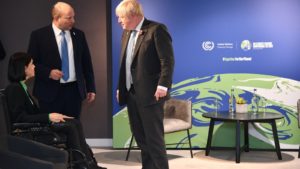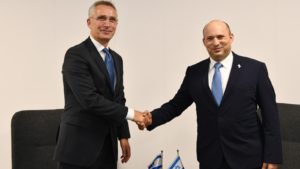Israeli Prime Minister Naftali Bennett declared at the United Nations Climate Change Conference in Glasgow, Scotland that Israel will cut carbon emissions to net zero by 2050, a major announcement by the Jewish state. However, the conference, also known as COP26, is not just about the planet for Israel’s premier; it is also the first major conference of world leaders where Bennett has had a chance to rub elbows with other heads of state, his debut in the arena of top-league world politics.
Bennett took the opportunity to meet with a long list of world leaders at the conference, which began on Sunday. British Prime Minister Boris Johnson, US President Joe Biden, French President Emmanuel Macron and Indian Prime Minister Narendra Modi are just a partial list of the world leaders that Bennett met this week in quick succession in Glasgow, whether spontaneously or in arranged meetings. The premier also met the Bahraini crown prince, Salman bin Hamad Al Khalifa, for the first time. Bennett left the conference on Tuesday night.
Apart from the climate challenge, Bennett reportedly discussed with world leaders the Iranian nuclear program as well as Israel’s coronavirus booster shot campaign and its effectiveness.
The Hebrew news website Ynet quoted an unnamed official who said that “something is opening up in the international attitude toward Israel.” The official explained that Israel’s alignment with other countries on their zero-emissions goal marked Israel as “a normal place together with other developed countries.”

Israel’s Energy Minister Karine Elharrar, left, and Prime Minister Naftali Bennett meet with British Prime Minister Boris Johnson, right, at COP26 UN climate change conference in Glasgow, Scotland, Nov. 2, 2021. (Haim Zach /GPO)
In his speech at the event, Bennett said that “for the first time, Israel is committing to cutting greenhouse gas emissions to net zero by 2050.” He went on to say that though Israel is a small country and, thus, its footprint in absolute terms is small in any event, its “impact on climate change can be mighty.” Bennett announced at the conference the founding of a task force to help encourage green tech ventures.
Professor Eytan Gilboa, a researcher at Bar-Ilan University’s Begin-Sadat Center for Strategic Studies, told The Media Line that the Israeli premier’s busy schedule at the conference is because “Bennett arouses [their] curiosity. They don’t know him, and as a new prime minister, the leaders of course want to meet him. He’s met Biden, he has met with Putin, and now Europe’s leaders want to get to know him.”
This holiday season, give to:
Truth and understanding
The Media Line's intrepid correspondents are in Israel, Gaza, Lebanon, Syria and Pakistan providing first-person reporting.
They all said they cover it.
We see it.
We report with just one agenda: the truth.


Gilboa adds that the nature of the conference, which requires the cooperation of participants to achieve any measurable progress, makes it a convenient background for Bennett’s meetings. “The atmosphere at the conference was suitable for him to hold meetings and conversations because, in this case, everyone is on the same wavelength,” he said.
Israel’s unusual government, one which includes parties all along the Israeli political spectrum, adds to the curiosity surrounding Bennett, suggests Gilboa. In general, Israel’s new government and its members appear to be enjoying a warmer reception internationally, particularly from the EU and its members. Gilboa, however, isn’t sure that this indicates an essential change.
Yet, he notes, with the Israeli and Western stance on Iran possibly converging – as Israel has forsaken its attempt to influence the US not to reenter the nuclear agreement with the Islamic Republic, and Iran shows no sign of returning to the agreement – better relations between Israel, the Biden administration and Europe’s leading countries is understandable.
The Abraham Accords also have a part to play in the warmer acceptance Israel and its premier are enjoying. They partially “shattered some preconceptions, in Europe mainly,” that the Israel-Palestinian conflict and its resolution was “the most important conflict in the world,” explains Gilboa. Now, he believes, there is greater understanding that agreements between Israel and Arab countries can be reached, even if the conflict remains unsolved. Furthermore, the Palestinian stance is seen as no less problematic than the Israeli position.
Last but not least, he said, “they think about the alternative. What would the alternative be? That Netanyahu will come back? That they don’t want.”

Israeli Prime Minister Naftali Bennett met with NATO Secretary General Jens Stoltenberg at the UN Climate Change Conference in Glasgow, Scotland, on November 2, 2021. (Haim Zach/GPO)
Dr. Emmanuel Navon, an international relations expert at the Jerusalem Institute for Strategy and Security, told The Media Line that for some leaders – and, he stresses, not all – “the fact that he [Bennett] isn’t Netanyahu is a lot in their eyes.” No less important, however, he says: “I think that generally, his personal interaction is very businesslike, very concrete and remains at face value,” and this attitude suits some of his fellow leaders, such as the British prime minister, Boris Johnson. “It appears that he [Bennett] has the ability to forge a good personal connection with other leaders, and that is most certainly important,” Navon said.
Of importance domestically, he notes, is that “Bennett has proven that it isn’t Netanyahu alone that can be prime minister and manage a foreign policy, which is basically what Netanyahu wanted us to believe; that he was a level above, that only he could shake hands with world leaders and talk to them as an equal.”
As to improving relations with Europe, Navon says that it depends on which countries in Europe.
“It is true that generally, during Netanyahu’s time, he developed relations specifically with countries in eastern Europe, such as Hungary and Poland, that nowadays are considered ‘rebels’ within the EU,” he said. Navon explains that Netanyahu’s intention was to assure the countries’ assistance in European Union votes. That, however, was not appreciated in Brussels.
Israel’s Foreign Minister Yair Lapid is pursuing a different policy of improving ties with Brussels and western Europe, which could explain warming attitudes. “Actions are what matters, however, [the question] is if there will truly be any kind of improvement in the attitude of the EU toward Israel,” he says.